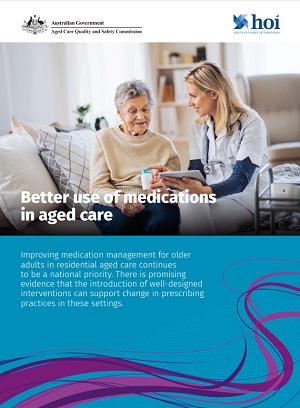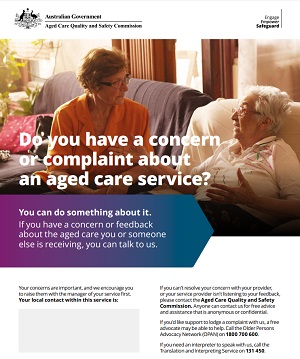This discussion paper explores strategies to improve medication management in aged care, including reducing inappropriate prescriptions and promoting non-pharmacological interventions. It reviews current interventions' effectiveness, highlights the use of psychotropic medications, and identifies areas for improving practices through multifaceted and multidisciplinary approaches for better resident outcomes and healthcare quality.
This resource may refer to information that will be updated from 1 November 2025 to align with the new Aged Care Act and Quality Standards.

Six steps for safe prescribing antipsychotics and benzodiazepines in residential aged care.
If you’re thinking of prescribing these medicines to manage the behaviours and psychological symptoms of dementia, follow these 6 steps.

What are psychotropic medications?
Psychotropic medications are ‘any drug capable of affecting the mind, emotions and behaviour'
The three main classes of psychotropics prescribed are antidepressants, anxiolytic/hypnotics (mostly benzodiazepines to manage anxiety and insomnia) and antipsychotics. Other psychotropic classes include anticonvulsants and stimulants.

Under the Aged Care Quality Standards, the organisation’s governing body is accountable for the delivery of safe and quality care and services. This includes consideration of leadership, organisational culture, consumer engagement, organisation wide governance, risk management and clinical governance.
This webinar will help you to understand your regulatory and legislative obligations.

Key documents and information to be available at commencement of performance assessment
Every performance assessment at a service’s premises begins with an entry meeting between the person in charge at the service and the Assessment Team. The Assessment Team will request certain key documents during the entry meeting at site audits, review audits and assessment contacts where performance against the Aged Care Quality Standards (Quality Standards) is being assessed.

A practical guide developed by the Working Group on Influenza Outbreaks in Residential Care Facilities on behalf of the Communicable Diseases Network of Australia. The purpose of the document is to assist residential care services and carers by providing best practice information for the prevention and management of influenza outbreaks in residential care facilities.

To assist aged care providers, the Commission has identified some of the very useful information and resources produced by Commonwealth and State Departments of Health.

RB 2019-04 (Rescinded)- This Regulatory Bulletin outlines how the Commission will respond to and manage non-compliance with the Aged Care Quality Standards.

A fact sheet outlining the key changes impacting providers under the new Commission Rules, relating to the Aged Care Quality Standards (Quality Standards).

Aged Care Quality and Safety Commission Statement of Intent 2019.

The Aged Care Quality and Safety Commission Statement of Expectations 2019.

This fact sheet outlines how the Aged Care Quality and Safety Commission supports providers to resolve complaints.
Provider resolution involves us referring complaint issues that a complainant raises with us to a provider to resolve. Where possible, we choose this approach as it is often the best way to have concerns effectively resolved.

Top tips for service providers managing complaints.

A poster outlining how to raise a concern about the quality of care a person is receiving.
This resource is available in 25 different languages including: Arabic, Armenian, Chinese Traditional, Chinese Simplified, Croatian, Dutch, English, French, German, Greek, Hindi, Hungarian, Italian, Korean, Latvian, Macedonian, Maltese, Polish, Portuguese, Russian, Serbian, Spanish, Tagalog, Turkish, Ukrainian and Vietnamese.









